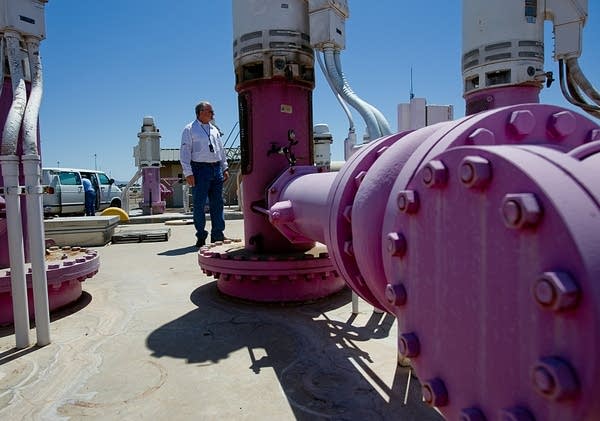Your take: The Tucson water use model

Go Deeper.
Create an account or log in to save stories.
Like this?
Thanks for liking this story! We have added it to a list of your favorite stories.

Our coverage on lessons Tucson, Ariz., may have for water use in Minnesota is getting a strong audience response. People generally fall into one of two camps. One group says following Tucson's lead is a "no-brainer" while others say we don't have much of a water problem here in the Land of 10,000 Lakes.
Tucson grown substantially yet kept water consumption flat through a variety of conservation and reuse measures. The city encourages greywater use and rainwater capture; it recycles treated wastewater through a “purple pipe” system to golf courses, parks, schools and homes for irrigation; it stores water it doesn’t need today in underground aquifers.
Should Tucson's water ethic be a blueprint for Minnesota?
"Yes, of course," wrote L. L. Herold of Rochester. "Wasting treated municipal water costs us all. Running grey water for lawns & gardens saves twice, very common sense. City governments should encourage this."
Yasser Abouaish of St. Paul said that Tuscon isn't a good model for Minnesota. "While certain water conservation approaches might be appropriate for Tucson, the emphasis in Minnesota should be placed first on water efficiency practices, minimizing leaks and lost revenue as well as regional planning leading to cost cutting."
"Like oil, water is not being saved but wasted. But since we have no obvious shortage, people seem to feel no urgency to save water for future generations," writes Mary Theresa Downing of Excelsior.
"To the extent that we can learn from that city's experience, definitely," wrote Phil Soucheray of Saint Paul. "White Bear Lake is down and it seems apparent that the drain on our aquifer system is already something we need to be attentive to. Water is a finite resource. Alternative means of reuse of greywater and rain water applications make sense."
"I don't know enough about engineering to understand the economic costs of following Tucson's example, but it isn't hard to foresee the environmental and eventual social costs of doing nothing," writes Bruce Benson of Northfield. "It is time for the entire country, not just Minnesota, to start treating water as something precious."
"Its unfathomable that we throw away billions or trillions of gallons of water every year into the ocean via the Mississippi River," writes Christopher Loch from Minneapolis. "It is such a waste, such a reckless policy, such a debt we are creating to future generations and a truly economic debt at that, not just a figurative one, as they will pay dearly to have the water we enjoy today, unless we turn it around soon."
Maggie Todd wonders why MPR News would even bother with the issue. "We don't have a drought. I live here. I have to question if there is some manipulation going on in order for people to think MN is a drought area. I clearly remember an interview with the head of Nestle stating " that people think the water belongs to them and it doesn't". Really?"
"Tucson is desert, Minnesota is not. One-sized-fits-all solutions are rarely helpful," writes Kevin Masrud of Stewart. "Minnesota should first consider ending the ethanol madness before trying to find other solutions. If you want to stop the bleeding, first try not cutting your arm off."
"Should it? Maybe. Could it? Not in a 100 years with the bureaucracy as it stands right now," writes Mark Hayes of Buffalo. "There is no desire in the state agencies to change the status quo and the legislature has no expertise or desire to have that expertise in drafting a bill that would force the issue."
Master plumber Paul Kerr said even if Minnesota has plenty of water, "Iit would make sense to conserve water, just for the amount of energy we use to process our drinking water and treat our wastewater."
"Re-framing how we think about water is critical," wrote Sandra Wolfe Wood of Stillwater. "Our freshwater is both precious and under assault. 75% of the earth's surface is made up of water, but only 2.5% of that water is usable fresh water; and of that 2.5%, 2/3 of it is locked up in icecaps or glaciers (which are quickly melting into the oceans). Of the rest, almost all (99%) is found in underground aquifers, and is being used faster than it can be replenished. Minnesota is not immune to this, as you have reported on MPR. Tucson is in a dry region that will live or die based on how they handle water. Minnesota should take note and stop taking water for granted."
You can read more responses to our coverage and share your views here or share your views in the comments.
Turn Up Your Support
MPR News helps you turn down the noise and build shared understanding. Turn up your support for this public resource and keep trusted journalism accessible to all.
Dear reader,
Political debates with family or friends can get heated. But what if there was a way to handle them better?
You can learn how to have civil political conversations with our new e-book!
Download our free e-book, Talking Sense: Have Hard Political Conversations, Better, and learn how to talk without the tension.



